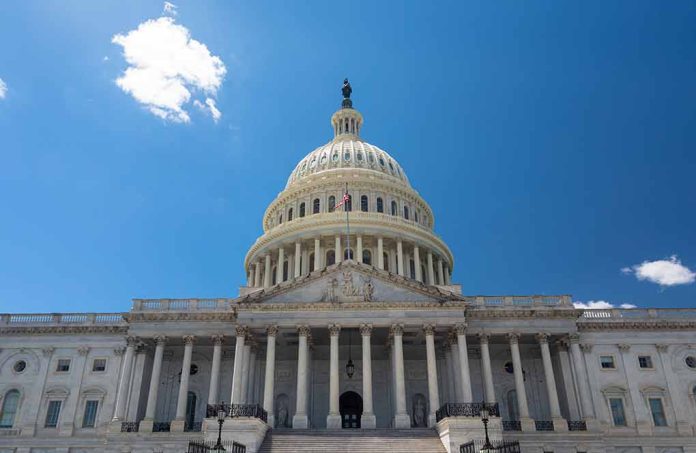
Congress has voted to avert a government shutdown with a short-term funding bill, leaving out the Trump-backed SAVE Act.
At a Glance
- Congress passed a stopgap measure to fund the government through December 20.
- The bill includes $230 million for the Secret Service but omits the SAVE Act.
- More Democrats than Republicans supported the measure in the House.
- Another funding deadline looms before the holidays and new Congress.
- Concerns persist about a potential omnibus spending package in December.
Lawmakers Avert Shutdown with Bipartisan Support
In a display of bipartisan cooperation, Congress has successfully passed a short-term government funding bill, narrowly avoiding a shutdown just 40 days before the upcoming election. The measure, which funds federal operations through December 20, received more support from Democrats than Republicans in the House, highlighting the complex political dynamics at play.
The stopgap bill, known as a continuing resolution (CR), passed with a 341-82 vote in the House and a 78-18 vote in the Senate. Notably, all 82 opposing votes in the House came from Republicans, signaling ongoing divisions within the party over spending measures.
Congress funds the government but faces another shutdown threat before Christmas https://t.co/JnP2HW7v7I
— Yahoo News (@YahooNews) September 26, 2024
SAVE Act Omitted, Secret Service Funded
While the bill successfully keeps the government operational, it notably excludes the Trump-championed SAVE Act. This omission represents a setback for Republicans who had pushed for its inclusion. However, the measure does allocate $230 million to the Secret Service, a provision added following a recent assassination attempt on former President Donald Trump.
“We are not going to return to the Christmas omnibus spending tradition, and that’s the commitment I’ve made to everyone,” House Speaker Mike Johnson told reporters after the House passed a stopgap funding measure Wednesday. He went on to add about the possibility of an omnibus in December, “We’ve worked very hard to break that tradition … and we’ll see what happens in December.”
Johnson, who initially attempted to pass a six-month resolution, ultimately moved forward with this shorter stopgap measure to secure bipartisan support. Johnson’s stance against large, last-minute omnibus spending packages sets the stage for potential conflicts as the next deadline approaches.
Looming Challenges and Future Negotiations
With funding set to run out again on December 20, lawmakers face a tight schedule to negotiate and pass 12 separate appropriations bills needed to fund federal agencies for the 2025 fiscal year. The proximity to the holidays and the transition to a new Congress and presidential term adds further complexity to these negotiations.
“I expect that we’ll negotiate an omnibus,” said Rep. Debbie Wasserman Schultz, D-Fla., a member of the Appropriations Committee. She added that a continuing resolution passed Wednesday after Johnson said there would be none.
Despite Speaker Johnson’s opposition to omnibus packages, many senior appropriators anticipate that a sweeping omnibus spending package will ultimately be necessary. This expectation stems from the limited time available during the lame-duck session and the historical precedent of recent Congresses relying on such measures to keep the government funded.
The Road Ahead: Funding Challenges and Political Realities
As lawmakers look toward the December deadline, several factors will influence the funding negotiations. The results of the upcoming election will play a crucial role in shaping the political landscape and potentially altering the balance of power in Congress. Additionally, concerns about the national debt, voiced by representatives like Chip Roy, R-Texas, may further complicate efforts to reach a comprehensive funding agreement.
While the House has passed five of the 12 required appropriations bills and the Senate Appropriations Committee has advanced 11 out of 12, significant work remains. For the government to be fully funded, identical versions of all 12 bills must pass both chambers – a challenging task given the current political climate and time constraints.
As the clock ticks toward the next funding deadline, the nation watches to see if Congress can break the cycle of last-minute, massive spending bills or if history will repeat itself with another eleventh-hour omnibus package just before the holidays.
Sources
- Congress funds the government but faces another shutdown threat before Christmas
- Senate, House pass bill to avert government shutdown, setting up December fight
- Congress passes 3-month funding extension to avoid government shutdown

















